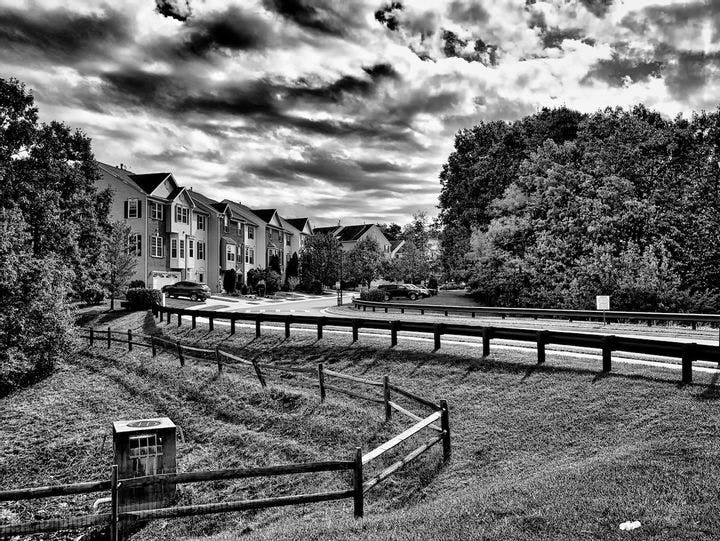Winter 2010
Monochrome Life
– Darryl Lorenzo Wellington
By tying power and privilege to racial identity, we impoverish our understanding of one another and undercut collective commitment to a social contract of equality.
Between 2007 and 2009, the young African-American political commentator Rich Benjamin spent much of his time living a suburban fantasy—posing as a home buyer researching high-end properties, living in fashionable condominiums and gated communities, and studying with professional trainers to sharpen his golf game. His foray into enclaves of wealth and comfort might seem a mere vacation if it weren’t also a sociological study. “Statistics can tell you only so much,” he explains at the outset. “Understanding the spirit of a people and the essence of a place requires firsthand experience.”
The dwindling statistical dominance of whites in the country as a whole has been accompanied by a marked rise of segregated white enclaves; in these upscale communities, whites make up 85 percent or more of the residents. While traditional suburbs diversify and the poorest urban areas warehouse minorities, since 2000 Whitopias (i.e., white utopias) have posted at least six percent population growth, most from non-Hispanic whites. Culturally, they are conservative; politically, they are typically Republican. Often, they are designed by developers to cater to old-fashioned, Ozzie and Harriet values. The residents are neither blind to the homogeneity of their environs nor apologetic about it. “I don’t like the use of the term white flight,” says a resident of Coeur d’Alene, Idaho. “It’s sort of cultural flight.”
Aside from Coeur d’Alene, Benjamin spent time in Forsyth, Georgia, and St. George, Utah, as well as a blue-state Whitopia: the Carnegie Hill neighborhood of Manhattan. He says that he encountered no overt racial hostility in these places, and, while his very presence was an implicit critique of these communities, his judgments (arguably) err toward generosity.
He empathizes with Whitopians’ fear of urban crime. He defends the principle of ethnic diversity, but commiserates with those who have abandoned it because they have seen “diversity done badly.” He writes of bonding with his neighbors while playing golf, in rapturous prose that gently mocks the game’s stereotypical associations: “On the resplendent green, I too escape my modest city abode, my work stress, my history, my identity, my skin. Whack!” He even puts the best face on a visit to a church that preaches racial purity, expressing mere annoyance rather than real rancor. Overall, Benjamin concludes, Whitopias are populated by decent and “delightful people” who have inoculated themselves against guilt or discomfort over yawning socioeconomic inequities.
The dark side of Whitopias is revealed less in interpersonal relations than in residents’ peculiar obsessions, most notably with illegal immigrants. In St. George, Benjamin attends a meeting of a group that calls itself the Citizens Council on Illegal Immigration, at which a speaker presents a slide show of ominous images of wild-eyed, dark, Hispanic men. Benjamin observes that St. George’s safety fixation—the maze of security systems installed in home after home, restrictive zoning laws, and fierce anti-immigration sentiment—smacks of fear beyond a rational relationship to the immediate threat. Zealotry, if not racism.
Benjamin concludes his book by attempting to make a broader argument about how to achieve racial harmony and eschew ethnic and class balkanization in the 21st century. Mapping a plan to achieve a post-racial America, he tosses off easy summary judgments. Inner-city blacks must “redouble their efforts to achieve the American dream,” he declares, though the daily hardships of the poor have received scant attention in the book. More than the absence of black and Latino perspectives, however, it’s the lack of attention to working-class and poor whites that hampers his attempt to wade through a mire of diversity issues. Still, Benjamin’s case against Whitopias is clear: By tying power and privilege to racial identity, he suggests, they impoverish our understanding of one another and undercut collective commitment to a social contract. Fearsome institutions—though not populated with fearsome people.
* * *
Darryl Lorenzo Wellington is a culture critic whose essays frequently appear in Dissent.
Reviewed: "Searching for Whitopia: An Improbable Journey to the Heart of White America" by Rich Benjamin, Hyperion, 2009.
Photo courtesy of Flickr/Henk Sijgers
